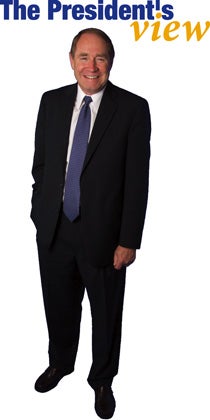Our URI Community
 Two years—two move-in weekends, two commencements, and everything in between—have passed since Lynn and I joined the University community. It doesn’t feel like that much time has elapsed, but when I reflect on the issues, challenges, and opportunities that URI has tackled, I am impressed by how much the people of URI have accomplished. The context in which we work continues to change. Many would argue that the challenges facing URI are even greater now than they were two years ago.
Two years—two move-in weekends, two commencements, and everything in between—have passed since Lynn and I joined the University community. It doesn’t feel like that much time has elapsed, but when I reflect on the issues, challenges, and opportunities that URI has tackled, I am impressed by how much the people of URI have accomplished. The context in which we work continues to change. Many would argue that the challenges facing URI are even greater now than they were two years ago.
Certainly, today’s national economic climate poses substantial risks for public higher education. Funding for students via Pell grants and subsidized loans may be significantly reduced, making access to higher education difficult precisely when more people are seeking to gain the knowledge and skills needed to compete in the global economy. Federal research funding will likely decrease, precisely when our nation needs new knowledge and discoveries.
Here in Rhode Island, as in many parts of our country, the economic recovery is slow and inconsistent. Unemployment remains high and the state’s business climate, which is a critical factor in creating new jobs, continues to lag behind the competition. Our state, and practically all of the cities and towns in Rhode Island, faces potentially catastrophic pension liabilities.
In such circumstances it would be understandable for URI to disengage, to stand pat and hope for better times. That would be a damaging mistake. As never before, Rhode Island needs URI, its public research university, to take a leading role in overcoming the challenges faced by the state and its people. In fact, I think that leadership should become the fourth component of the historic land-grant university mission in addition to teaching, research, and service.
Surely, our state and nation need the University of Rhode Island to do more research, to improve student learning and completion, and to provide more of our expertise to our communities, businesses, and organizations. Perhaps you have read, or heard me say, that meeting these needs will require URI to be more innovative and transformational in what we do. It is gratifying to see the progress that URI has made over the past two years. And we will keep at it! As you read QUAD ANGLES or follow us through our many other communication vehicles, we will continue to tell you about the astounding work being done by URI faculty and students.
Finally, I think that this University, and other research universities, ought to take on a stronger and more prominent leadership role in society. Whether the challenge is building robust and sustainable economies, or building diverse globally conscious communities, or bringing objective analysis to important public policy issues, universities like URI have (or can develop) the expertise and commitment to lead. Based on my experience here over the past two years, I am confident that our leadership would be broadly welcomed and viewed as transformational. As part of the URI community, our alumni can help provide that leadership. I am confident that you are prepared to do so.
 Home
Home Browse
Browse Close
Close Events
Events Maps
Maps Email
Email Brightspace
Brightspace eCampus
eCampus


